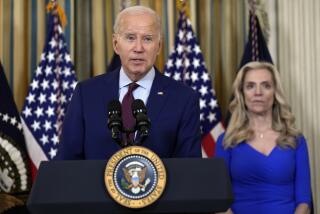China Plans to Relax Economic Controls
- Share via
BEIJING — Plans to make new state-owned corporations responsible for many of the activities now managed directly by the government were unveiled Monday in a proposal presented to the National People’s Congress.
The State Council’s restructuring proposal, which calls for abolition of 14 ministries and commissions and the formation of 10 new ones, is part of a general reformist effort to enliven China’s economy by lessening direct government control over it.
“We will not simply abolish some offices, merge others and cut back staff, but introduce changes in their functions,” State Councilor Song Ping said in presenting the proposal to the congress.
The present structure, he said, suffers from “too rigid micromanagement” and “insufficient macrocontrol”--in other words, the government bureaucracy should stop running so much of the country’s economy and should improve its ability to influence the overall environment for economic activity.
Management Change
“According to the principle of separating the government and enterprises, government departments will no longer perform the functions of managing enterprises directly,” the New China News Agency said in a summary of Song’s speech. “The government’s direct management of enterprises will be gradually changed into indirect management.”
Under the proposal, the ministries of railways, petroleum, coal and nuclear power will be abolished and corresponding corporations will be set up.
“These corporations . . . will be, in essence, economic entities operating independently and assuming full responsibility for their own profits and losses,” the news agency said. “This will help invigorate enterprises and streamline administrative offices.”
A newly created Ministry of Personnel will promote the separation of Communist Party cells from direct government administration, the agency said. It also will supervise the introduction of a civil service system.
More to Read
Sign up for Essential California
The most important California stories and recommendations in your inbox every morning.
You may occasionally receive promotional content from the Los Angeles Times.










